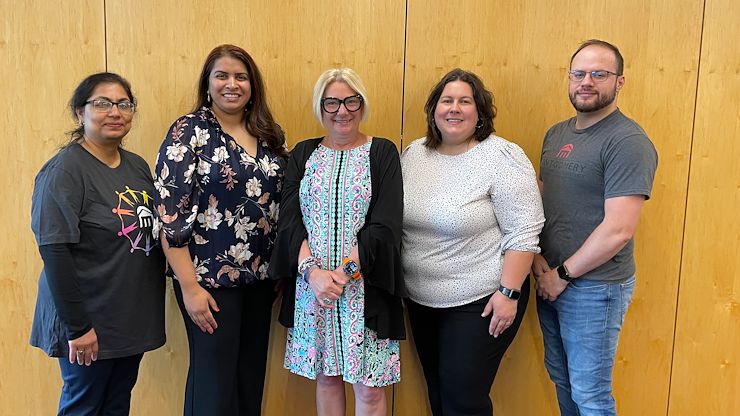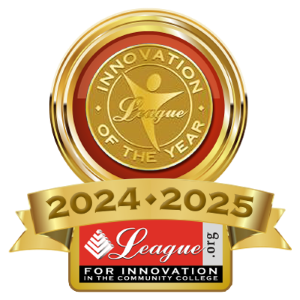
(From left) Shuktara Das, Research Director, Institutional Effectiveness; Jeslin Mathew, Assistant Professor, Communication Studies; Meredith Frank, Communication Studies Assistant Professor; Bridget Haines-Frank, Executive Director, Institutional Effectiveness; and Matthew Kilbride, Academic Technologies Innovation Specialist. The League for Innovation in the Community College presented a 2024-2025 Innovation of the Year Award to Montgomery County Community College in recognition of its Virtual Reality for Public Speaking Skills project. Photo by Diane VanDyke
A Montgomery County Community College project that has helped many students face their fear of public speaking using virtual reality technology is being recognized on a global stage.
The League for Innovation in the Community College, an international nonprofit organization, recently presented a 2024-2025 Innovation of the Year Award to MCCC in recognition of its Virtual Reality for Public Speaking Skills project.
 “To enhance students' public speaking skills and combat speech anxiety, Montgomery
County Community College has integrated a virtual reality software application into
its courses and tutoring sessions,” according to the project’s submission. “VirtualSpeech
allows students to practice and record speeches in various authentic virtual environments,
such as classrooms or conference stages, and receive feedback. The feedback includes
AI-generated content summaries and performance metrics on words per minute, body language,
eye contact, and filler words. The software is used in communications courses and
is available to all at the College through the Presentation Practice Lab.”
“To enhance students' public speaking skills and combat speech anxiety, Montgomery
County Community College has integrated a virtual reality software application into
its courses and tutoring sessions,” according to the project’s submission. “VirtualSpeech
allows students to practice and record speeches in various authentic virtual environments,
such as classrooms or conference stages, and receive feedback. The feedback includes
AI-generated content summaries and performance metrics on words per minute, body language,
eye contact, and filler words. The software is used in communications courses and
is available to all at the College through the Presentation Practice Lab.”
After watching a demonstration Matthew Kilbride, Academic Technologies Innovation Specialist gave on the possibilities of using the wearable Meta Quest 2 VR headset technology, Meredith Frank, Communication Studies Assistant Professor, launched a pilot program in spring 2023 to incorporate virtual reality headsets into her public speaking classes. Since that time, the project has continued to grow and the technology is now available to all students on both the Blue Bell and Pottstown campuses.
The League recognized Frank, Kilbride, as well as Shuktara Das, Ph.D., Research Director, Institutional Effectiveness; Bridget Haines-Frank, Ed.D., Executive Director, Institutional Effectiveness; and Jeslin Mathew, Assistant Professor, Communication Studies, for their collective work on the project.
Frank and Kilbride said it’s been a joy to see the project evolve over time.
“I’m incredibly proud,” said Frank. “I feel like I started it with Matt Kilbride. He was behind the scenes and knew virtual reality. I needed to learn virtual reality. I knew public speaking. I work with students to combat speech anxiety and this was another layer. Thank you to Matt and Jeslin for coming on board. Thanks to the researchers. It took the whole team.”
“It’s been great to share this work the team has been able to put together,” said Kilbride. “We had the project starting just after pilot testing in a single course. Since then, bringing on Jeslin and additional headsets, licenses and partnering with Shuktara and Bridget for more data to see the project’s effectiveness. It’s great to share what we’ve been doing with everyone else.”
Mathew, Das and Haines-Frank expressed their appreciation for the projection’s recognition, and especially for its role in supporting student success in a course that many students consider intimidating.
“I’m very honored,” said Mathew. “It’s a cool way to help our students with their public speaking fear.”
“I’m likewise feeling very honored,” said Das, who with Haines-Frank relied on assessment data, observation of student classes and survey responses to measure the project’s effectiveness. “I saw in the qualitative data the fun and enjoyment students had. It spoke to me as a former communications instructor. That’s often missing in public speaking classes. Fear takes the fun from it. Students don’t see themselves enjoying public speaking. Practice can be boring. The virtual reality practice brings back the fun in the process. To see that from the assessment and survey data was interesting and enlightening to me.”
“Innovative practices can support students in different ways,” said Haines-Frank. “For some students, it did help reduce their anxiety. For others, it gave additional opportunities to hone their skills. Whether in the classroom or the practice lab, students made the application customizable to their needs.”
Each year MCCC holds an Innovation of the Year Awards competition for which employees can nominate projects that advance the College’s strategic plan and meets one or more of the following criteria: cost effectiveness, creativity, efficiency, impact, quality, replication and timeliness. MCCC’s Innovation of the Year committee identifies the top three innovations and submits its recommendations to the College president, who selects the winning innovation and submits it to the League for Innovation for recognition.
The League for Innovation in the Community College is an international nonprofit organization with a mission to cultivate innovation in the community college environment. The League’s Innovation of the Year Awards recognize significant innovations of members at Board and Alliance member colleges. Participating colleges announce the Innovation of the Year competition internally, and after selecting a winning innovation, the institution submits it to the League for Innovation for recognition.
